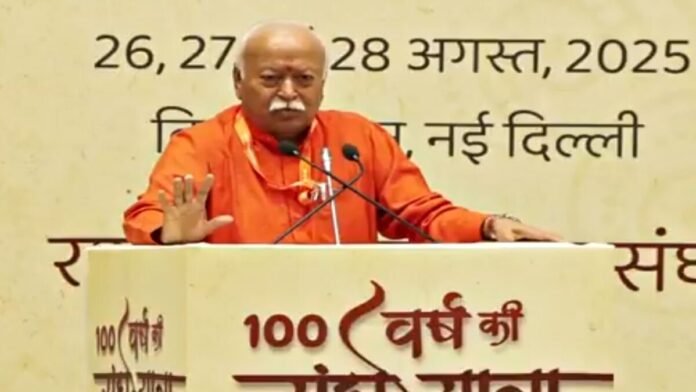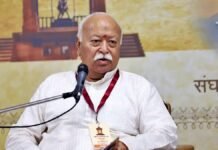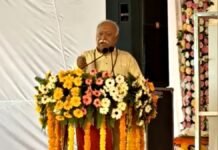
Key Points
- RSS chief Mohan Bhagwat raises alarm over “wokism” and cancel culture, calling it a global crisis.
- Says society now values intolerance over dialogue; even families fear its effect on children.
- Links rising individualism, consumerism, and materialism with erosion of traditional values.
- Quotes Mahatma Gandhi’s “Seven Social Sins”, highlighting their relevance today.
- Presents India as a global guide, urging the nation to live by the example of dharma.
- Message: World needs harmony and morality, not forced ideologies or conversions.
Nagpur: Rashtriya Swayamsevak Sangh (RSS) chief Mohan Bhagwat has sounded a warning against what he called two of the 21st century’s most dangerous cultural phenomena “wokism” and “cancel culture.”
Addressing a large gathering of RSS volunteers and intellectuals in Nagpur on August 27, Bhagwat said modern society is losing the ability to engage in constructive dialogue.
“Today, people no longer wish to reason or discuss they only want compliance with their views. If one does not echo their opinion, they cancel us. This intolerance has become a global epidemic,” he observed.
Parenting Concerns & Cultural Erosion
Bhagwat noted that rising intolerance and extremism have left even parents worried about their children’s exposure to aggressive online culture, where dissenting voices are often silenced.
He attributed this to the dominance of individualism, unchecked consumerism, and materialism, which, according to him, have weakened the fabric of family values and societal restraint.
“When restraint and traditional values are abandoned, intolerance fills the gap,” Bhagwat said.
Recalling Gandhi’s “Seven Social Sins”
In his speech, Bhagwat invoked Mahatma Gandhi’s timeless warning on “Seven Social Sins” (politics without principles, wealth without work, pleasure without conscience, etc.), noting their continued and growing relevance in today’s consumer-driven world.
“Pleasure without conscience and commerce without morality are destroying us more now than in Gandhi’s times,” he warned.
India as a Global Example of Dharma
Amid these challenges, Bhagwat presented India as a beacon of hope for the world.
He clarified that dharma is not a dogma or a religion, but a natural universal law that sustains society and the cosmos.
“Dharma has never spread through conversions or force,” Bhagwat asserted, “it only spreads through practice and example, like water flows by its very nature.”
He urged India to embody harmony and dharma in practice, so that the world may be naturally inspired to follow without compulsion.
India’s Duty in a Fragmented World
Bhagwat concluded by saying:
- The world does not need lectures or impositions, it needs living examples.
- It is India’s historic responsibility to model dharma for the global community.
- By living dharma in everyday practice, India can guide societies fractured by polarization, intolerance, and cultural extremism.
“The future of the world lies in harmony, and India must show the way not by dominance, but by dignity,” he affirmed.
Latest Updates (27 Aug, 9 PM IST)
- Bhagwat’s remarks come amid tense US-India relations, after Donald Trump imposed steep tariffs on Indian exports over Russian oil imports.
- Political observers see his speech as both cultural and geopolitical messaging, projecting India’s role as a civilizational guide at a time of trade and diplomatic turbulence.
- Public reaction is trending online with hashtags #DharmaPath and #MohanBhagwat; some praise his warning on cancel culture, while critics argue the term “wokism” is being misused in Indian context.
Mohan Bhagwat’s remarks directly link the global rise of intolerance, cancel culture, and moral erosion to deeper systemic issues of consumerism and individualism. By positioning India as a model of dharma, he suggests that the country has both a cultural and moral responsibility to lead the world toward a more harmonious future.






















































